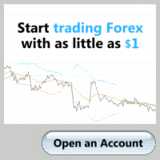Read this – a great forex primer:
What's Forex?
"Forex" stands for foreign exchange; it's also known as FX. In a forex trade, you buy one currency while simultaneously selling another - that is, you're exchanging the sold currency for the one you're buying. The foreign exchange market is an over-the-counter market.
Currencies trade in pairs, like the Euro-US Dollar (EUR/USD) or US Dollar / Japanese Yen (USD/JPY). Unlike stocks or futures, there's no centralized exchange for forex. All transactions happen via phone or electronic network.
Who trades currencies, and why?
Daily turnover in the world's currencies comes from two sources:
* Foreign trade (5%). Companies buy and sell products in foreign countries, plus convert profits from foreign sales into domestic currency.
* Speculation for profit (95%).
Most traders focus on the biggest, most liquid currency pairs. "The Majors" include US Dollar, Japanese Yen, Euro, British Pound, Swiss Franc, Canadian Dollar and Australian Dollar. In fact, more than 85% of daily forex trading happens in the major currency pairs.
The world's most traded market, trading 24 hours a day.
With average daily turnover of US$3.2 trillion, forex is the most traded market in the world.
A true 24-hour market from Sunday 5 PM ET to Friday 5 PM ET, forex trading begins in Sydney, and moves around the globe as the business day begins, first to Tokyo, London, and New York.
Unlike other financial markets, investors can respond immediately to currency fluctuations, whenever they occur - day or night.
This is an essential read for you – even if it seems technical in nature, you should read it anyway, just to get the information in your head one time. I suggest you read all articles here, start to finish. Getting a background in the market takes about a week (at most), but it's very important for you to understand how the system works.
The knowledge you gain early will pay off later. I didn't read this stuff BEFORE trading, and it actually kind of helps to read through the material while you’re entering and watching your first trades – because there’s nothing quite like trading while you learn. Read the sections in "Forex Essentials". This is as clear an explanation as exists.
What's Forex?
"Forex" stands for foreign exchange; it's also known as FX. In a forex trade, you buy one currency while simultaneously selling another - that is, you're exchanging the sold currency for the one you're buying. The foreign exchange market is an over-the-counter market.
Currencies trade in pairs, like the Euro-US Dollar (EUR/USD) or US Dollar / Japanese Yen (USD/JPY). Unlike stocks or futures, there's no centralized exchange for forex. All transactions happen via phone or electronic network.
Who trades currencies, and why?
Daily turnover in the world's currencies comes from two sources:
* Foreign trade (5%). Companies buy and sell products in foreign countries, plus convert profits from foreign sales into domestic currency.
* Speculation for profit (95%).
Most traders focus on the biggest, most liquid currency pairs. "The Majors" include US Dollar, Japanese Yen, Euro, British Pound, Swiss Franc, Canadian Dollar and Australian Dollar. In fact, more than 85% of daily forex trading happens in the major currency pairs.
The world's most traded market, trading 24 hours a day.
With average daily turnover of US$3.2 trillion, forex is the most traded market in the world.
A true 24-hour market from Sunday 5 PM ET to Friday 5 PM ET, forex trading begins in Sydney, and moves around the globe as the business day begins, first to Tokyo, London, and New York.
Unlike other financial markets, investors can respond immediately to currency fluctuations, whenever they occur - day or night.
This is an essential read for you – even if it seems technical in nature, you should read it anyway, just to get the information in your head one time. I suggest you read all articles here, start to finish. Getting a background in the market takes about a week (at most), but it's very important for you to understand how the system works.
The knowledge you gain early will pay off later. I didn't read this stuff BEFORE trading, and it actually kind of helps to read through the material while you’re entering and watching your first trades – because there’s nothing quite like trading while you learn. Read the sections in "Forex Essentials". This is as clear an explanation as exists.
The information contained in this document, although highly entertaining and quite instructive, might lead you to believe that tomorrow you’re going to be a millionaire. You are not going to be a millionaire tomorrow. Well…that’s technically not correct. Because you could be a millionaire already, in which case tomorrow you’re guaranteed to be one.
- Strategy: Low-risk, High-return Forex Trading
- The Four Groups
- The Basics
- Pips
- Greed
- Revenge
- A Different Strategy
- 10 Principles
- The Daily Routine


